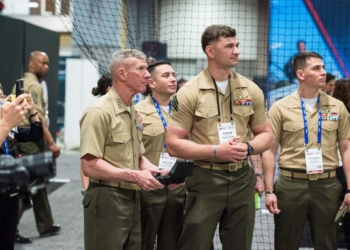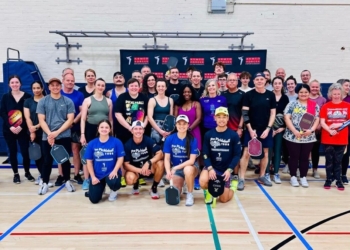A young mental wellness advocacy organization at RAF Mildenhall is inspired to tackle lockdown-related frustrations after a recent visit with the first lady.
Alongside her husband, Dr. Jill Biden visited the overseas Air Force base in Suffolk, England, on Wednesday, June 9 to meet with and encourage airmen and their families. Military family support, she says, is one of her top priorities as first lady.
“No one has more strength and grit and resilience than our military families, but you can’t do this alone,” she said to a large crowd during a speech at the base. “We have to help you carry this weight by approving access to mental health resources, ensuring everyone can put food on the table, and supporting caregiving families and survivors.”
The words were music to the ears of Mildenhall’s new Wellness Advocate Team (WAT). Founded amidst the COVID-19 lockdowns last October by Senior Master Sgt. Jamil Vazquez, WAT exists to prevent mental health crises in its airmen and their families. It uses trained “advocates” who make their way around assigned squadrons across the 100th Air Refueling Wing, chatting with airmen and staff about their everyday lives, hobbies, relatives, and current challenges.
“Simply listening to people and making them feel heard is something I never take lightly,” said Nicci Wohlcke-Davidson, a WAT Wellness Advocate with the 100th Security Forces Squadron. “It is incredibly powerful to speak and truly be heard.”
The UK is currently under a third wave of strict lockdowns, curbing out-of-country travel, among other things. Socialization has been limited to workplace interactions, meaning stay-at-home parents and children are usually isolated, almost to extremes. Confusion with ever-changing mandates, the advocates add, has only increased the mental load.
“Honestly, it’s hard to keep track of what we’re allowed to do or not, as many of the rules for socializing are focused around a total number of folks per group and the number of people from different households and how many different households can mix, but children under 12 don’t count — unless they do,” said WAT member Megan Phillips. “The lack of structured social or community events due to the pandemic has many more people than usual feeling lost and alone.”
Biden came ready to hear those concerns, as she knew about WAT in advance and requested a pre-speech photo opportunity and post-speech meeting with its advocates. She had multiple questions about the program and its methods, Phillips says, and wanted to hear about the advocates’ experiences.
“She was easy to talk with without needing to ease into difficult or heavy topics,” she said. “Just that she was interested in the well-being of our AD members as well as dependents in the face of this hard year was meaningful to me.”
Wohlcke-Davidson particularly appreciated how Biden referenced career challenges for military spouses, as that obstacle is often even more prominent in overseas assignments. The lack of options, she says, can be emotionally and mentally taxing on the entire family.
“I really hope through our interaction with the first lady that we see de-stigmatized outlook and repercussions on members seeking mental health [resources],” she said. “Seeking a therapist for things like anxiety, life crises and such should not be career-breakers.”
Overall, the advocates say the first lady’s visit and personal attention gave them a much-needed morale lift to keep fighting against the depression, anxiety, and loneliness they see so often on base now.
“It gave us all a confidence boost, because sometimes days are hard and you just don’t know if what you’re doing matters,” said Wohlcke-Davidson. “I’d say that being commended by the President is definitely a step in a good direction.”
To learn more about WAT or to speak with their team, visit their Facebook page.
Read comments







































